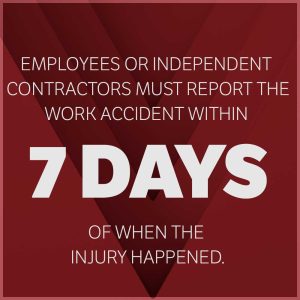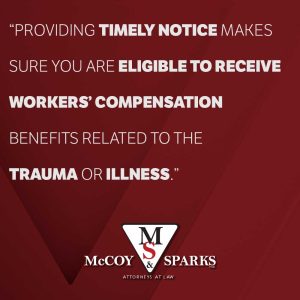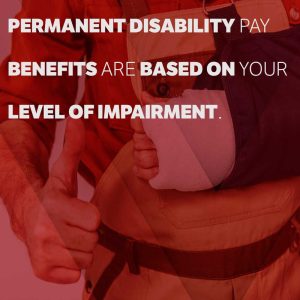
Sustaining an injury while on the job is a stressful experience. Between worrying about getting proper medical care, recovering missed wages, and wondering if you’ll be able to return to your normal work duties, you have a lot of questions.
One concern for injured employees is knowing how long they have to report their Kentucky workers’ compensation injury in order to claim workers’ compensation benefits in Kentucky.
The timeframe for reporting a work-related injury or illness is an important factor when filing a workers’ compensation claim. Kentucky law sets specific limits dictating how soon you must notify your employer and file a claim after suffering a workplace accident or occupational disease. Meeting these deadlines is crucial to avoid denial of your workers’ compensation benefits.
Here’s what a Kentucky employee needs to know about promptly reporting work injuries to get the workers’ comp benefits they deserve.
Notifying Your Employer

The law in Kentucky states that an injured employee should provide notice of their work-related injury to their employer immediately. More specifically, the employees or independent contractors must report the work accident within 7 days of when the injury happened.
For a work-related illness such as black lung or repetitive stress injury such as carpal tunnel syndrome that develops over time, an employee must notify their employer no more than seven days after receiving a medical diagnosis listing the ailment as a work-related condition.
Reporting as soon as possible serves two purposes. First, it allows your employer to direct you to proper medical treatment and make any necessary modifications to prevent similar incidents. Second, providing timely notice makes sure you are eligible to receive workers’ compensation benefits related to the trauma or illness.
After notifying your employer, be sure to get written documentation or confirmation that they received notice of your workplace incident, even if you’re at a new job. This creates a record that your Kentucky workers’ comp claim should any dispute arise later over whether proper notice was provided.
Time Limits for Filing Kentucky Workers’ Compensation Claims
A worker must also formally file an actual claim for workers’ compensation benefits with the Kentucky Department of Workers Claims. Under Kentucky workers’ comp law, you have two years from the date of the incident or last income payment to file your workers’ compensation claim with the state.
For occupational diseases, the employee is eligible for either two years from diagnosis or three years from when symptoms first appeared to file your workers’ compensation claim, whichever is earlier. These strict filing limits by law underscore the need to connect with an experienced workers’ comp attorney soon after your workplace injury occurs rather than trying to navigate the workers’ compensation claims process alone and risk being denied.
An attorney ensures your workplace accident or cumulative reports and related medical paperwork are properly completed and submitted to the Kentucky Department of Workers’ Claims within the required timeframe for your occupational disease or other condition.
The Department of Workers’ Claims will also manage regular follow-ups to guarantee your workers’ compensation claim is being correctly processed and not unnecessarily delayed, which could jeopardize the process, your benefits, and payment.
What Does Kentucky Workers’ Compensation Cover?
Workers’ compensation provides benefits to employees in Kentucky who suffer work-related injuries or illnesses. Kentucky workers’ compensation law states that most employers are required to carry workers’ comp insurance.
This covers medical treatment, lost wages, and other costs for injured employees.
Medical Compensation
Kentucky workers’ compensation covers all reasonable and necessary medical treatment related to your injury or illness. This includes expenses like hospital bills, physical therapy, medications, assistive devices, and mileage for appointments.
You are entitled to free medical treatment until you reach maximum medical improvement.
Lost Wages
If your condition prevents you from working for more than 7 days, workers’ comp provides wage replacement benefits under temporary total disability. This equals two-thirds of your average weekly wage, up to a maximum set by state law. Wage benefits are paid until you can return to work.
Permanent Impairment Benefits
If your work injury causes permanent impairment, you may receive benefits after you have reached maximum medical improvement (MMI). Permanent disability pay benefits are based on your level of impairment. Permanent total disability provides lifetime wage benefits if you cannot return to any type of employment.
Settlements in a Kentucky Workers’ Comp Claim
Workers’ compensation settlements are sometimes negotiated, especially for serious injuries like amputations, head/brain trauma, or permanent disabilities. A lump-sum settlement can provide injured workers with vital compensation.
Overall, Kentucky workers’ compensation aims to be a no-fault system focused on quickly getting medical care and wage benefits to injured employees. However, legal assistance may be needed if your claim is denied or your employer refuses to cooperate.
Experienced attorneys can help maximize settlement amounts during the claims process.
Who Pays the Kentucky Workers’ Comp Benefits?
In Kentucky, workers’ compensation benefits are paid by private insurance companies, not the state government. Kentucky law requires nearly all employers to carry workers’ compensation insurance coverage. This transfers liability for work injuries from employers to the insurance carrier.
When an employee is injured on the job, they file a workers’ compensation claim with their employer’s insurance company. The insurer then investigates the claim and makes a determination.

If the insurance carrier accepts the claim as compensable, they will pay out medical expenses and lost wage benefits directly to the injured worker or their healthcare providers. The insurance company foots the bill for all costs related to the work incident, not the employer.
However, the employer pays premiums to the insurance carrier for the workers’ compensation policy. So employers indirectly bear some of the financial burden through higher premium payments if they have a history of frequent employee claims. Individual benefit payments come directly from the insurer once a claim is approved.
In cases where an employer fails to carry proper workers’ compensation insurance, the Uninsured Employers’ Fund administered by Kentucky’s Department of Workers’ Claims may provide benefits. But typically, the insurance company is responsible for paying benefits to injured employees per Kentucky’s workers’ comp laws.
This approach delivers prompt care and wage replacement to employees hurt on the job while shifting liability costs away from employers.
What Should I Do if My Employer or the Insurance Company Denies My Workers’ Compensation Claim?
If your workers’ compensation claim in Kentucky is denied by your employer, don’t panic. There are steps you can take to appeal the decision and get the benefits you deserve.
The first step of the process is to find out exactly why your claim is being denied. Request this in writing from your employer and the insurer. Often claims are denied due to technicalities or insufficient information. Your attorney can help collect proper documentation and statements to overcome these issues.
You may need to prove that your injury or illness was directly caused by your job duties. Your lawyer can gather evidence establishing this work-related connection. Witness statements from coworkers can corroborate your account of how the incident occurred.
If the problem is delayed reporting, explain any legitimate reasons for late filing of your claim. Retain pay stubs and time sheets to demonstrate you provided prompt notice within 30 days of the incident.
If the denial still stands after presenting evidence, you can request an appeal hearing before an administrative law judge. Your lawyer will represent you and reiterate the merits of your claim before a judge at the Kentucky Department of Workers’ Claims.
Having an experienced attorney during this process maximizes your chances of overturning a wrongful claim denial. Data shows injured workers receive substantially higher claim approvals and benefit amounts when retaining legal counsel.
Receiving Ongoing Kentucky Workers’ Compensation Payments
After reporting your workplace injury and filing a workers’ comp claim with the state, you must monitor the administration of your benefits throughout your treatment.
This includes:

- Verifying your medical bills are being paid by your employer’s workers’ compensation insurance carrier as required.
- Confirming you’re receiving the correct amount of temporary disability income payments replacing 2/3 of your average weekly wages.
- Requesting an impairment rating evaluation once you reach MMI to qualify for permanent disability benefits.
- Appealing any denials or modifications to your workers’ compensation payments by your employer or their insurance company.
Contact a Kentucky Workers’ Compensation Attorney for Your Workers’ Comp Claim
As a worker or independent contractor, Kentucky workers’ compensation law requires injured workers to report any work-related injury or illness and file a workers’ compensation claim within a short window.
By notifying your employer within 7 days and filing a claim with the state within 2 years, you preserve your ability to collect benefits like medical expenses, disability pay, and vocational retraining.
Partnering with trusted attorneys guarantees you meet these deadlines so your workers’ comp benefits aren’t wrongly denied down the road.
Call our experienced legal team or attorneys today to discuss your workplace trauma and make sure your rights are protected.
At McCoy & Sparks, we have experience helping work-related injury victims. Schedule a free consultation with our team here or call 844-459-9467.

